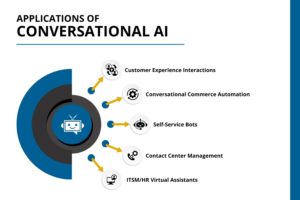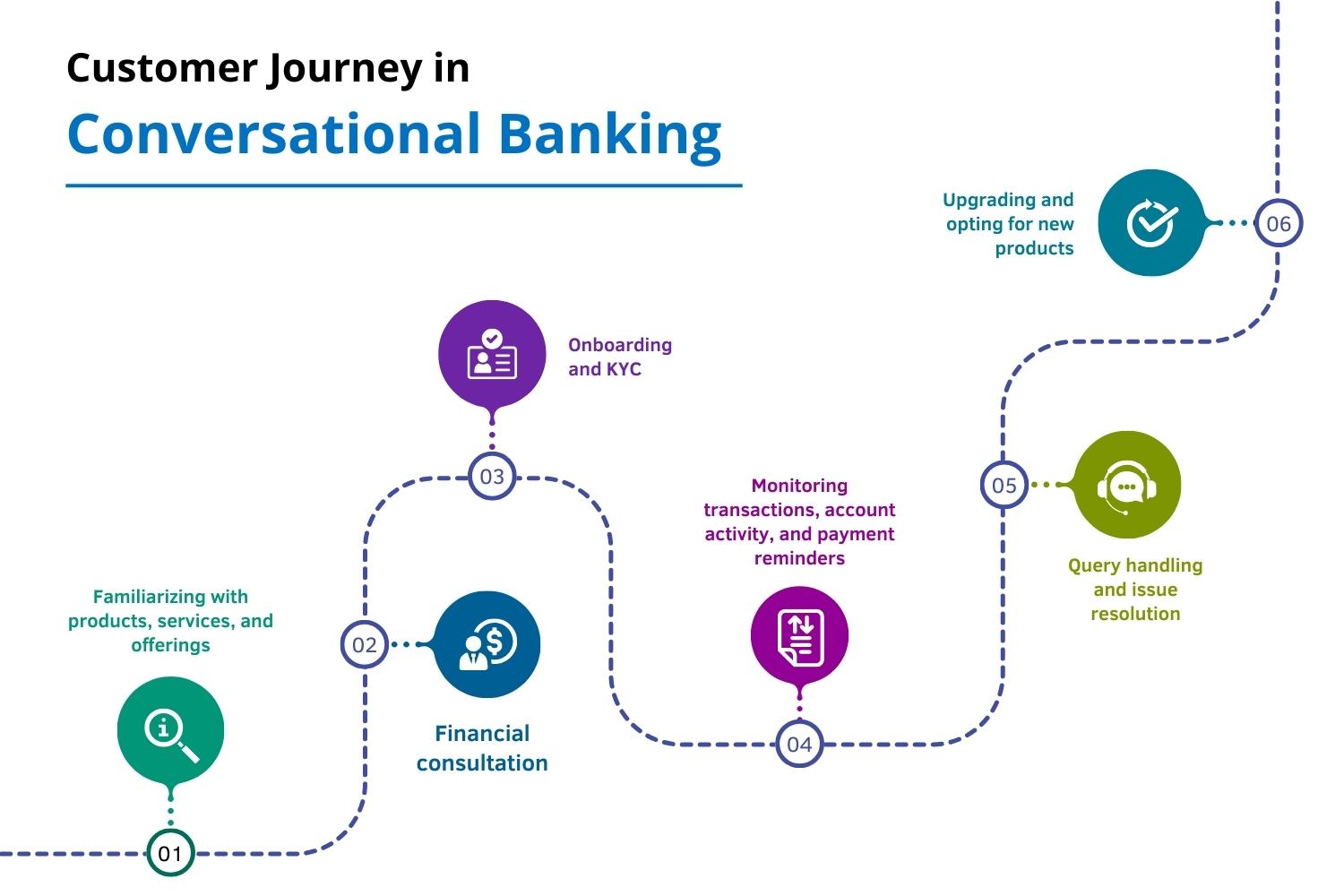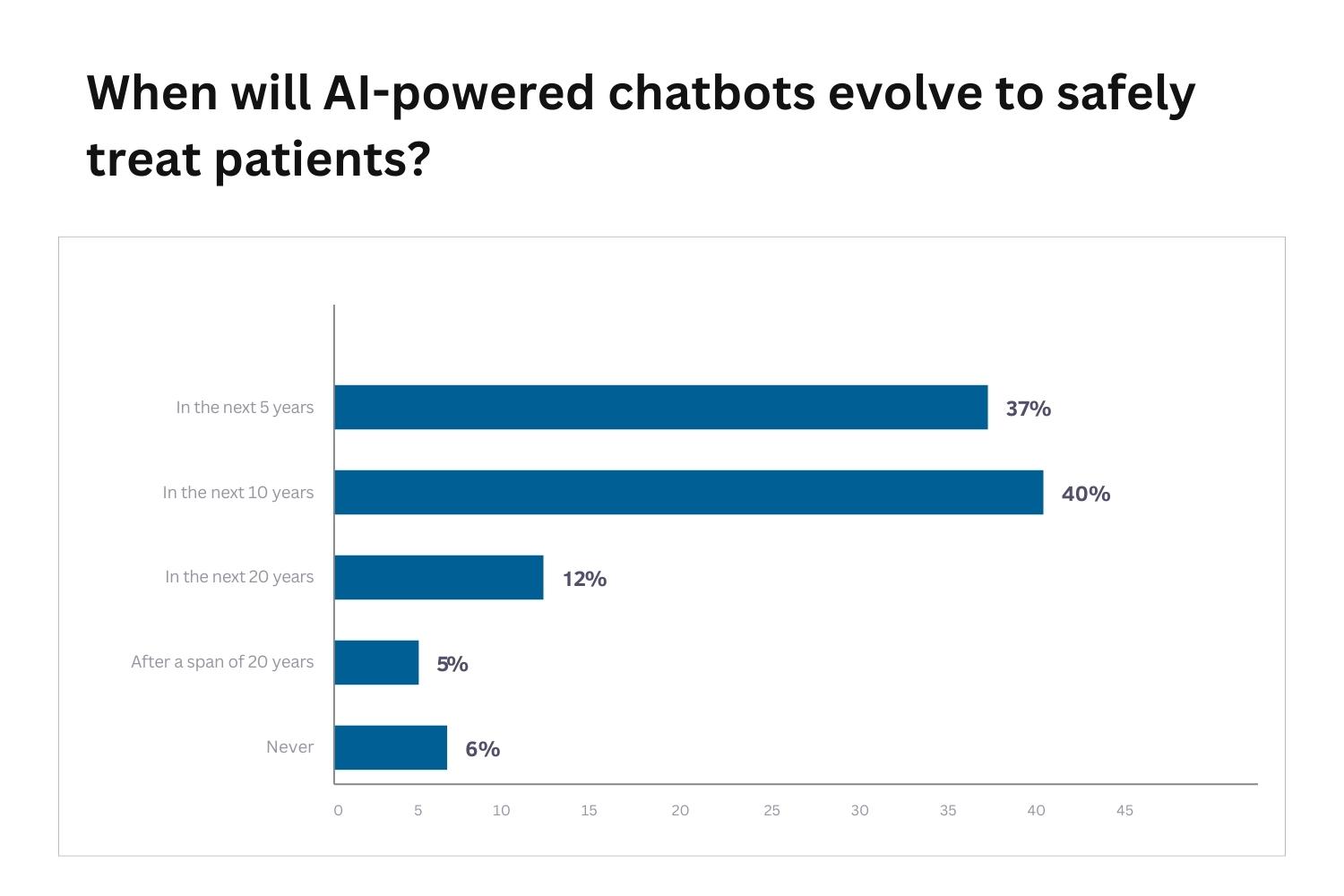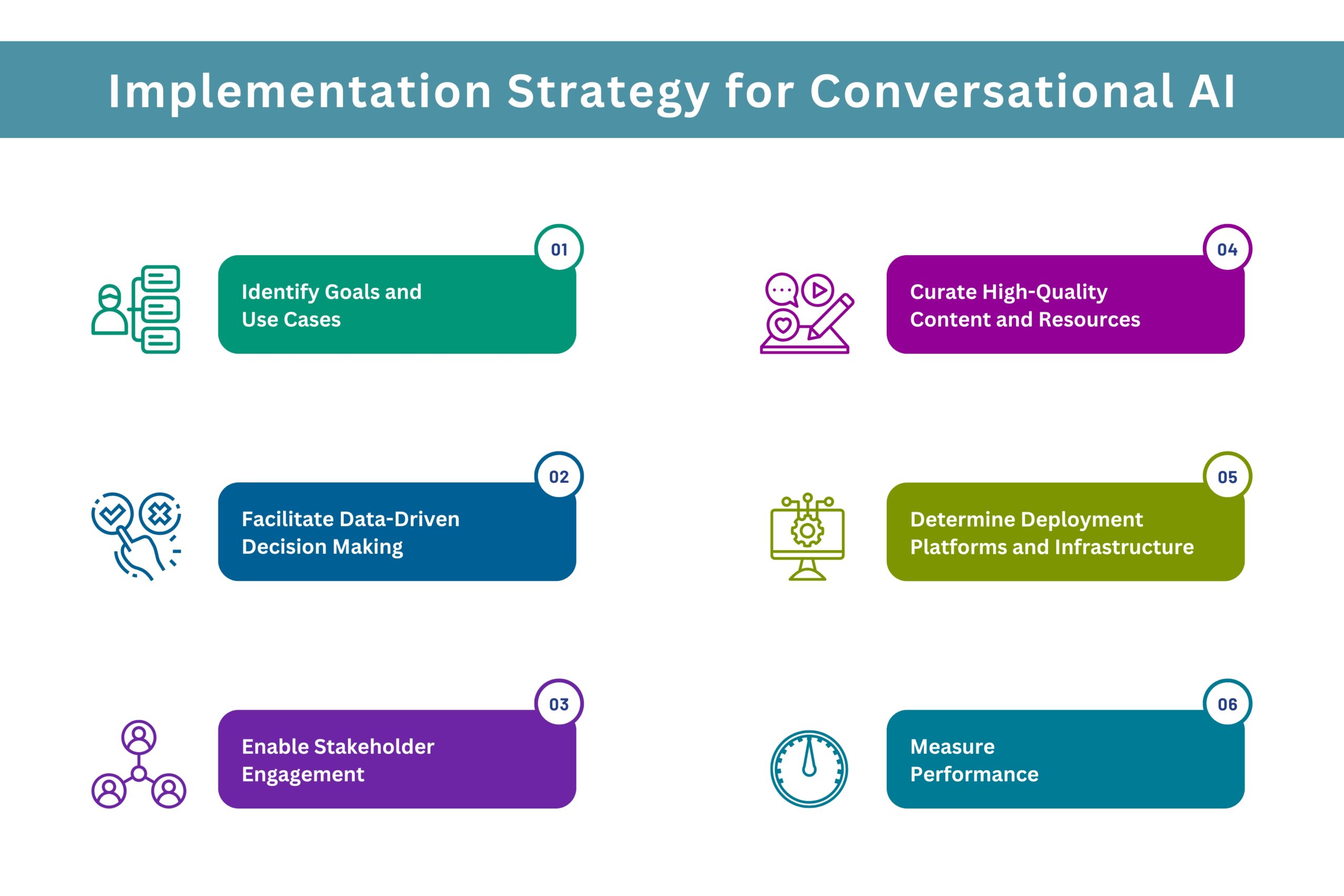“The effect of AI will be to amplify human-corrective intelligence. There’s a future where all our interactions with the digital world will be mediated by an AI system.”
– Yann LeCun, Chief AI Scientist at Meta
Global thought leaders such as Yann LeCun predict that AI systems have the potential to become more intelligent than humans in some areas and perhaps in every area at some point in time. World-renowned futurist and technologist Bernard Marr mentioned in his 2022 LinkedIn article that nearly 70% of chatbot conversations are estimated to grow prominent in the retail industry by 2023.
In this blog, we’ll learn about conversational AI use cases in different industries, the technology’s implementation strategy, and emerging trends shaping AI’s future.
Understanding Conversational AI
Conversational artificial intelligence is a type of AI that can emulate human conversations. This technology uses a combination of natural language processing (NLP), machine learning (ML), and natural language understanding (NLU) to process and respond to human text & speech.
The chatbot market is expected to reach $1 billion by 2025. Developers are deploying technological advancements in bots to provide agentless solutions to complex multi-step problems.
Engineers are innovating in chatbots and virtual agents so that these systems can understand and respond to voice-based or text-based human conversations. The key difference between conversational AI and generative AI is the former simulates human-like conversations through chatbots and voice assistants to support tasks by providing helpful information. Whereas, gen AI creates new content to produce innovative and diverse outputs in the form of music composition and content creation. Nevertheless, both technologies work best when used as a combination in solutions.
Key Use Cases of Conversational AI
Conversational AI is enabling businesses to deliver exceptional brand experiences through channels like messaging apps, websites, and mobile apps. AI voice assistants help with automatic speech recognition (ASR) to understand human voice inputs, eliminate background noice, process the input, and mimic a human-like response.
An increasing number of consumers are satisfied with conversations with well-designed voice assistants. The image below illustrates key use cases of conversational AI like self-service bots, customer experience interactions, and IT service management virtual assistants that are broadening the market scope for tech companies.

Conversational AI use cases revolutionizing the market are:
- Greater Inclusivity: Apart from providing valuable information to customers, tech giants are developing solutions that support disabled individuals. Conversational AI technologies can help these individuals navigate through a website or provide guidance for using an application.
- Social Media: Retail brands can engage users on social media in real-time by responding to comments, deploying AI assistants that offer tailored product recommendations, and interacting with potential customers in direct messages.
- Conversational Commerce Automation: Customers are using AI chatbots to pick and choose products on eCommerce platforms. Improved user experiences like booking online tickets and hotel reservations from the comfort of home benefit both tech companies and users.
Conversational AI in Customer Service
Building robust conversational AI systems requires conversation designers to gain expertise in multi-turn conversations to go back and forth between contexts and refer to multiple things in the same conversation. Shyamala Prayaga — senior software product manager at NVIDIA GenAI, opines that developers should adopt the progressive disclosure approach where the conversational AI system starts assisting with the bare minimum and progressively discloses other abilities.
Important conversational AI use cases in customer services are:
- Customer Relationship Management: Integrating conversational AI solutions with customer relationship management systems allows the foundational models to capture customer history and offer personalized advice to customers.
- Enhance Customer Engagement: Conversational AI systems are capable of reaching out to potential customers with personalized messages. From customer feedback to product recommendations, AI helps to create curiosity about your brand’s products and services.
- Improved Customer Support: Interactive voice response (IVR) systems and chatbots help businesses extend customer support across time zones and beyond the standard workday. These systems assist in managing basic requests and allow employees to focus on other mission-critical tasks.
Conversational AI in E-commerce and Retail
As Google plans to roll out Gemini Live — an AI voice assistant for free-flowing conversations, Rick Osterloh — senior vice-president of Google devices and services, claims the tool can perform complex tasks like creating research reports.
Looking at these innovations, stakeholders in the e-commerce and retail market are increasing efforts to optimize revenue per customer and reduce cart abandonment.
The top use cases for conversational AI in the e-commerce and retail market are:
- Adaptive Customer Segmentation: Studies say conversational AI can contribute to a 67% increase in sales. For instance, in a jewelry store, AI-driven conversational tools assist in identifying the group of customers that often purchase platinum pieces. This insight helps in developing targeted promotion of the upcoming platinum collection.
- Seamless Inventory Management: In e-commerce, chatbots help automate stock-level inventory management monitoring. These tools also suggest the reordering of high-demand products and ensure inventory is efficiently managed.
- Virtual In-Store Experience: Advanced AI chatbots are creating an enriched digital shopping experience for customers. These bots provide material details upon inquiry and suggest care instructions for washing.
Conversational AI in Healthcare
Based on a survey, nearly 77% of doctors believe that AI chatbots will have a high likelihood of treating patients safely in the coming decade. Like in the image below, almost 40% of the respondents suggest that AI-powered chatbots could safely treat patients within the next 10 years.
Source: Software Advice 2023 Medical Chatbots Survey
Critical use cases for conversational AI in the healthcare industry are:
- Prioritizing Emergency Cases: AI chatbots help with initial health assessment by asking a series of questions to the patient and escalating potential emergency cases based on the patient’s medical history.
- Mental Health Counseling: AI-powered bots are proving to be a revolution in mental health support for patients. Tech companies are upgrading chatbots with NLP to understand the user’s input and provide empathetic responses for consolation & comfort.
- Payment and Claims: Conversational AI use cases in healthcare are growing prominently for managing invoice payments and claims. Conversational AI-driven ITSM (Information Technology Service Management) streamlines this process by providing detailed invoices, generating auto-invoices, and forwarding the patient’s account to the insurance department.
Conversational AI in Financial Services
According to a study, 49% of the respondents said that customer service drives loyalty. Bots are proving instrumental in increasing customer interaction, without extra expenditure.
Conversational banking is a new-age way of providing financial services to customers. The image explains a customer’s journey in conversational banking, where the individual or entity gains information about the bank’s products and services, follows through with onboarding, and carries out regular transactions.

Some benefits of conversational banking are:
- Customer Retention and Loyalty: 89% of consumers like to access information and resolve queries through messaging apps and channels they’re familiar with via two-way communication. Banks adopting this approach have more loyal customers.
- Scalability: As the customer base grows in banks, financial institutions can leverage conversational tools to manage huge volumes of tickets rather than maintain large teams that are available round the clock to solve queries.
- Innovation: Conversational tools help to capture customer data that can be used to target personalized solutions to consumers and entities by addressing individual customer requirements.
- Customer Lifetime Value (CLV): Strategically deployed conversational solutions have the potential to enable upselling and cross-selling opportunities to customers. This is because customers need support even after a purchase, and banks can stay receptive to such needs.
- Employee Efficiency: An omnichannel environment integrates automated message flows with business solutions, saving time and ensuring employees receive accurate data. Conversational AI tools enhance organizational agility and help employees efficiently complete their tasks.
Conversational AI in Human Resources and Recruitment
Since employee experience demands new HR solutions, conversational AI use cases in human resources and recruitment are:
- Employee Retention: Since job satisfaction is an essential factor in retaining employees, companies should encourage employees to use conversational AI-powered virtual assistants to simplify and accelerate task completion.
- Rethink HR Processes: Automating conversational processes like leave approvals, payroll and compensation, attendance management and the like can help HR teams to focus on high-value work and become true business partners for the company.
- Recharge the Workforce: To enable personalized interactions at large with employees, companies need to upgrade their AI & ML capabilities to build conversational AI platforms that engage employees with a single-window service for unified and cohesive communications.
Conversational AI in Education and Training
As per sources, companies using AI-driven technology witness a 12% increase in customer satisfaction. Allie Miller — top AI leader and former global head of ML business development at Amazon (AWS), posted on LinkedIn that ChatGPT is exploding with conversational AI features and companies like ElevenLabs are proving a game changer for generating human-like speech in seconds.
Similarly, the education and training industry is undergoing a seachange for innovative conversational AI use cases due to digital learning and remote employee training:
- Personal Coaching: Conversational AI chatbots can coach tutors on how to deal with students with special needs and suggest interactive teaching techniques using attractive teaching materials, videos, and audio.
- Leadership and Management Training: Conversational AI technologies provide engaging training through interactive simulations and real time feedback to aspiring leaders.
- Virtual Teaching Assistants: Conversational bots function as stand-in teaching assistants by recommending relevant study materials to students, instantly responding to questions, and speedily evaluating assessments
Conversational AI in Marketing and Sales
Amazon plans to revamp its business model for Alexa by integrating next-gen conversational GenAI in its superior version. Such trends are encouraging businesses to upgrade their sales and marketing strategies.
Use cases for conversational AI in marketing and sales are:
- Streamlining Sales: According to a research, nearly 99% of respondents stated an increase in customer satisfaction with the help of virtual agent technology. AI-powered assistants help to manage routine tasks like setting up appointments and streamlining sales processes.
- Sales Script Guidance: One of the key conversational AI use cases is during sales pitch assistance, where bots provide support by answering questions, offering product information, and helping representatives deliver compelling pitches.
- Lead Qualification: In B2B sales and marketing processes, AI powered chatbots are capable of automating lead qualification and filtering out qualified leads to sales reps, increasing speed to lead.
- Building Virtual Agents: Since cross-channel communication is vital in any marketing and sales strategy, the favored solution Amazon Lex is gaining traction for quickly building conversational AI interfaces and deploying omnichannel conversations across multiple languages.
Implementation Strategy For Conversational AI
Google Cloud is releasing data-focused updates to help businesses transform Gemini into conversational AI-based data agents to understand the user’s intent perfectly and perform various tasks. Like Google, companies can develop conversational AI solutions to fulfill business needs.
Like in the below image, businesses can implement a step-by-step process to build solutions that align with their business objectives.
Here’s a useful strategy to give you more context on the implementation process:
- Identifying Goals and Use Cases: Start by noting specific business problems and defining your end goal around them. For instance, you’d want your support agents to handle complex customer queries while automating responses through chatbots to answer basic questions.
- Data-Driven Decision Making: Growing demand for customer engagement automation enables tech companies to analyze data and address repetitive questions using AI agents.
- Stakeholder Engagement: After identifying business challenges, it is time to involve compliance, security, and legal teams early on to gain approval from stakeholders for deployment.
- Curate High-Quality Content and Resources: The solutions you build are as good as the content and data sets you develop, such as customer support scripts and FAQs.
- Determine Deployment Platforms and Infrastructure: Selecting deployment channels like virtual assistants for in-store displays and deployment infrastructure like on-prem or cloud are crucial in the implementation phase to enhance customer outcomes and benefit the business.
- Measure Performance: Before launching the conversational AI solution across various channels, internally launch the system for user and security testing. After the launch, collect customer feedback and analyze data to assess how your conversational AI implementation strategy is performing.
Future Trends in Conversational AI
Conversational AI technology is expected to improve with advancements in NLP techniques, such as sarcasm detection and sentiment analysis to better understand the emotions and intent of the users’ inputs. Israel Krush — CEO & Co-founder of Hyro, a plug-and-play conversational AI platform for enterprises, suggests that conversational AI technology will improve through industry-specific use cases that either require proprietary data or other techniques using knowledge graphs that give unique attributes.
Responsible AI-powered conversations demand better data security, multimodal capabilities, and personalized experiences. Companies are trying to simplify interactions across digital platforms so that companies and their customers can communicate easily and achieve better outcomes.
What Role Do You See Conversational AI Playing In Your Enterprise?
To give a quick rundown of the blog, we learned that conversational genAI is in demand to better the performance of chatbots and virtual assistants. Free-flowing conversations and the ability to execute complex tasks like creating reports are projected to create value-grab opportunities for tech companies.
At AIT Global Inc., our data science team specializes in AI & ML solutions where we test hypotheses and scale up businesses in the competitive landscape. Check out our AI & ML solutions to discover our AI-fueled NLP capabilities to provide tailored products and services. Our recent blog on conversational AI and its functions shares insights on how businesses can use this technology to enable consistent customer experience and facilitate omnichannel presence.








 What is XBRL: Learn the Definition, its Benefits, and Trends
What is XBRL: Learn the Definition, its Benefits, and Trends  Agentic AI vs Generative AI: What’s the Difference and Why It Matters
Agentic AI vs Generative AI: What’s the Difference and Why It Matters  The Hidden Costs of Incorrect EDGAR Filing and XBRL Tagging – And How to Avoid Them
The Hidden Costs of Incorrect EDGAR Filing and XBRL Tagging – And How to Avoid Them  What is Agentic AI and How It’s Transforming Business Operations
What is Agentic AI and How It’s Transforming Business Operations  AI Tools For Small Businesses
AI Tools For Small Businesses